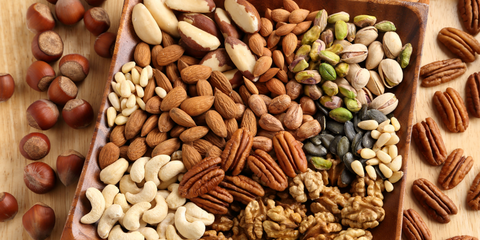The ketogenic diet is not only a great method for weight loss but it also improves the immune system. A few studies have shown that the keto diet could possibly help prevent illnesses such as Alzheimer’s, Parkinson’s disease, Multiple Sclerosis (MS), chronic pain, migraines, diabetes, epilepsy, Celiac Disease and more.
Ketosis and the Immune System
Ketosis is a metabolic state when the body uses ketones to fuel the body. When on a low-carb diet or fasting, the body produces ketones from fats. These ketones are used instead of glucose to fuel the brain and muscles.
Ketone bodies provide an alternative energy source for the brain and many organs. Ketones also play a role in inflammation and fighting cancer cells.
The Immune System: The immune system is composed of cells that protect the body from foreign invaders such as bacteria, viruses and fungi. It also helps with fighting cancerous cells when they arise.
How a Low-Carb Diet Helps Boost the Immune System
High-carb foods increase levels of insulin and glucose - these hormones suppress the immune system and prevent it from fighting infections properly. This causes inflammation, which plays a major role in the development of autoimmune diseases, such as Celiac disease.
Studies support that foods rich in carbs such as white bread, rice and pasta can harm the immune system.
Alternatively, a low-carb, or ketogenic diet, reduces both insulin and glucose levels, instantly helping boost your immune system!
A keto diet lowers blood sugar levels, which promotes better immunity by reducing oxidative stress from sugar intake. This means that your body will work better at fighting off infections and you will have more energy for other tasks throughout the day. Sounds like a dream come true, right?
The Role of Ketones in the Immune Response
Ketones are an alternative fuel to glucose in the body, providing an alternative, quick and easy source of energy.
Ketones are fatty acid compounds that are made when the liver breaks down fats.
The immune system relies on a constant supply of nutrients to ensure it functions properly and fights off infection properly. One particular nutrient that plays a key role in this process is ketone bodies.
A study found that the increase of ketones in the blood of participants caused shifts in immune cell activity!
Results showed the keto diet:
- Strengthened T-cells’ (a human immune cell) response to immune threats
- Improved peoples’ overall immune response
- Caused major shifts in specific genes related to inflammation and metabolism
- Boosted T-cells' ability to use energy
Autophagy
The keto diet can also induce autophagy: also termed ‘self-eating’, this is the process where our body cleans out and replaces damaged toxins or cells with new, healthier cells.
Whilst fasting is considered the easiest method of triggering autophagy, ketosis can equally boost autophagy.
Now, you may be wondering how exactly autophagy benefits the immune system.
Studies show that triggering autophagy can:
- Help you live longer by efficiently removing damaged proteins
- Boost response to infection and improve immunity
- Further reduce inflammation and boost metabolism
Keto and Illnesses
Ever since Covid began, health has become a major concern for many of us. We’ve realised how important it is to maintain a healthy body and build a better immune system. So let’s understand how the improved keto immune response benefits our bodies.
Fighting the flu
It seems that many of the positive bodily changes caused by keto should help fight off illnesses such as the flu. The keto diet reduces inflammation, which is a common symptom of flu and gout. Strengthened T-cell responses also means your body will be able to respond to things such as flu much faster.
Research supports how a ketogenic diet can reduce the likelihood of contracting influenza. Results showed that when mice were fed a keto diet, they showed reduced susceptibility to influenza infection compared to mice on a standard diet.
Of course, we can’t expect the reaction of animals to directly reflect how humans would react to keto.
This is why it’s best to try out the keto diet and reap the benefits yourself!
Health Conditions & Chronic Diseases
Keto has been beneficial for those with conditions such as:
- Heart disease
- High blood pressure / High blood sugar
- Epilepsy
- Autoimmune diseases, such as Celiac disease
And many more!
- Heart disease
Keto involves eating plenty of fat. Eating too much saturated fat can easily raise cholesterol levels, which is closely associated with heart disease. This is why it is important to consume healthy sources of fats, such as avocados, olives and nuts. Following the diet properly can reduce cholesterol levels and in turn, reduce the chances of developing heart disease!
Studies show that autophagy also can help remove damaged organelles and proteins in heart cells, which then reduces the chances of developing heart disease or other cardiovascular diseases.
2. High blood pressure & blood sugar
Plenty of research shows that blood pressure decreases in people following low-carb diets. By reducing blood sugar levels, blood pressure should also decrease. Though be careful, changes in blood pressure could mean your medication needs to be reviewed by your doctor.
Studies have found that the keto diet lowers blood sugar because of the little levels of glucose in the body. Results showed that people who followed the diet for a year with type II diabetes lost weight, required less medication and lowered A1c (blood sugar levels).
Impaired autophagy is considered one of the causes for type II Diabetes. Boosting autophagy through ketosis enables the body to protect damaged insulin-producing cells.
Overall, it seems that going keto can be beneficial for people with diabetes or high blood sugar levels!
3. Epilepsy
The ketogenic diet is considered an alternative treatment option for controlling seizures in some people with epilepsy. By reducing inflammation in the brain, the likelihood of experiencing seizures linked to inflammatory infections (such as autoimmune disorders and meningitis) is reduced.
Let’s think about seizures like this.
An over-excited brain releases too many excited neurotransmitters, like glutamate. Or, the brain is unable to control this excitability.
The keto diet reduces the amount of excited neurotransmitters and strengthens the ability to control the spread of excitability, then making seizures less likely!
4. Autoimmune diseases
Autoimmune diseases are becoming more common and there is not a cure for these diseases, but there are treatments that can help patients feel better. The keto diet may be an effective way to improve symptoms of autoimmune diseases such as ulcerative colitis and Crohn's disease.
When the keto diet is followed correctly, the combination of the anti-inflammatory effects from the ketones produced and the polyunsaturated fatty acids (Omega 3 & Omega 6) can help reduce autoimmunity. There is evidence showing how polyunsaturated fatty acids actually reverse many inflammatory diseases.
The diet is also perfect for those with Celiac disease, as a strict low-carb/high carb diet prevents consumption of any gluten, including bread or grains.
The Best Keto-friendly Food for the Immune System:
When there’s so many keto options, it’s important to know which particular foods play a major role in bringing about the health benefits we’ve discussed above.
The main vitamins and minerals you should make sure you’re eating are: Vitamin C, B6, E and Zinc.

Figure 1: Some keto-friendly foods that can help boost your immune system!
Some food that contain these essentials for boosting the immune system are:
- Avocados - Rich in antioxidants including vitamins A, B6, C & E.
- Cod - Cod liver oil and cod flesh are packed with Omega 3 fatty acids, perfect to help reduce inflammation.
- Almonds - A healthy source of fat that’s full of the antioxidant vitamin E.
- Poultry - Both chicken and turkey are key sources of vitamin B6, which is known to boost immune response.
- Turmeric - Another antioxidant that you can easily incorporate into your keto diet.
- Spinach - A source of vitamins C & E and rich in antioxidants that can help the body's ability to battle against infections.
- Olive oil - A source of healthy monounsaturated fats that have anti-inflammatory and antioxidant abilities. We recommend extra virgin olive oil as it is the least processed and refined.
The list goes on!
Should you try it?
It is clear that the keto diet has many health benefits beyond weight loss. If you have no major health conditions and want to prevent illness or strengthen your immune system, then definitely give the keto lifestyle a try and let us know how it goes!
However, trying the keto diet can be complicated when suffering from chronic disease. Whilst there are many benefits to keto you must consult your doctor beforehand - everyone’s health is different and professional advice is always best!
Still want more information about the keto lifestyle? Check out our blog post which explains the keto diet and how easy it is to truly follow!
We hope you gained some knowledge from this article and are considering whether keto is right for you. Comment below if you’ve got any questions! Feel free to share any positive stories you’ve heard about peoples’ health on keto.




Comments (0)
There are no comments for this article. Be the first one to leave a message!